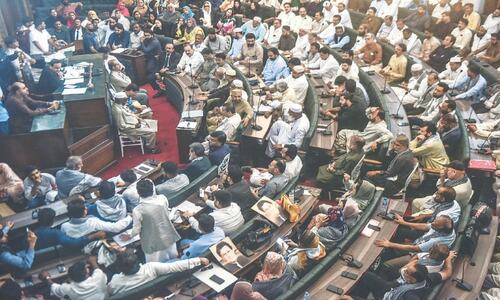KARACHI: Human rights, child rights and civil society activists, along with legal experts and representatives of independent human rights institutions, police and government officials on Thursday underlined the need to finalise the law to criminalise child domestic labour in order to curb this exploitative practice which, they described as a form of slavery.
They were speaking at a consultation session on the ‘Prohibition of the Child Domestic Labour Bill 2024’, jointly organised by the National Commission on the Rights of Child (NCRC) and Unicef in a local hotel.
The consultation was aimed at discussing the bill with stakeholders and getting their recommendations to be incorporated into the law.
They expressed serious concern about the increasing incidents of torture and even deaths of child domestic workers in different parts of the country.
Experts at NCRC-Unicef consultation session express concern over torture, death of young domestic helps
Two recent cases of torture of child domestic workers, of Fatima Furiro and Rizwana, have been highlighted by the media, but there may be thousands of such cases, which are not reported, the participants were told.
The main speakers included a member of the National Commission for Human Rights (NCHR), Sindh, Anis Haroon, a member of the Sindh Human Rights Commission (SHRC) Zulfiqar Shah, members of the NCRC Khalid Naeem and Pirbhu Lal Satyani, Imdad Channa from Sindh Child Protection Authority and chief field officer of Unicef Prem Chand.
Poverty was identified as the main reason for child domestic labour in Pakistan.
Both, parents and employers, who are mostly rich families, were deemed responsible for this menace, they pointed out.
The meeting participants stressed the need for providing incentives to parents and raise awareness of the importance of education.
The case of child domestic worker Fatima Furiro, who was killed in Khairpur Mirs district, was discussed as a test case, with consensus being that it needs to be brought to a conclusion.
The consultation also addressed the issue of girls being kept at home, emphasising the need for parental awareness and the role of NGOs in this regard.
Anis Haroon pointed out that over six million children were out of school in Sindh, which was an alarming situation.
Miqdad Mehdi, an advocate, pointed out that initially there was a denial of child domestic labour at the government and social levels. However, he said, over time, it was realised that it was a serious issue in our society. He referred to an expert’s statement that “child labour is a modern form of slavery”.
Zulfiqar Shah, a member of the SHRC, pointed out that the economy and political system were the main cause of such practice in Pakistan.
Syed Iqbal Zaidi, a member of the NCRC, revealed that 45 per cent of the population falls under child labour, and there is less enrolment in schools in Pakistan.
NCRC member Pirbhu Lal said the Prohibition of Child Domestic Labour Bill 2024 seeks to instigate transformative change by reinforcing legal measures against those involved in engaging children in domestic labour. By classifying Child Domestic Labour (CDL) as a non-compoundable, non-bailable, and cognisable offence, the NCRC underscores its commitment to prioritising the rights and well-being of children.
He explained this proposed bill intended to amend the Pakistan Penal Code, 1860, and the Code of Criminal Procedure, 1898, criminalising CDL and eliminating this widespread menace.
Titled the Criminal Amendment (Prohibition of Child Domestic Labour) Bill, 2024, it signifies a dedicated effort to protect the rights and dignity of children across Pakistan.
The bill proposes an addition of a new Section, 374-A, to the Pakistan Penal Code, 1860, specifically addressing child domestic labour. This section criminalises the employment, recruitment, harbouring, transportation or provision of a child below the age of 18 years for domestic labour, with penalties including imprisonment ranging from two to seven years and a fine not less than Rs.500,000. The offences related to child domestic labour are categorised as non-bailable, non-compoundable and cognisable.
Published in Dawn, January 5th, 2024












































Dear visitor, the comments section is undergoing an overhaul and will return soon.